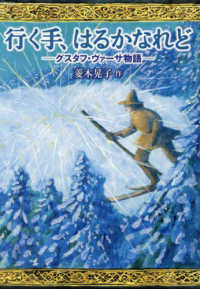- ホーム
- > 洋書
- > 英文書
- > Philosophy
Full Description
This book examines the nature of military ethics education after the Holocaust, using a range of national case studies.
The volume examines educational opportunities offered by a range of militaries, including the USA, Australia, Lithuania, Austria and Israel, and addresses substantive and contextual problems for ethical reflection on the basis of Holocaust history. The first half of the work indicates how the particular educational gains sought from courses on the Holocaust and military ethics provide grounds for wider discussions of the normative consequences of engagement with the Holocaust. The essays in the second half of the book turn to a variety of historical contexts before and during the Holocaust which raise substantive ethical issues: the formation of military professionals; treatment of prisoners; exercise of responsibilities in the face of institutional pressure; the relationship between ethical outcomes and organisational ideology; and the values of rescuers and resistors, including those organising their resistance in divergent Jewish and Christian communities.
This volume will be of interest to students of military ethics, peace and conflict studies, defence studies, Holocaust and genocide studies, and World War II history.
Contents
1 Introduction Part I: Military Ethics Education and the Holocaust 2 Educating for Military Ethics at the United States Holocaust Memorial Museum 3 The Holocaust, Genocide and Ethics: Dialogues Across Militaries at Auschwitz 4 The Use of the Holocaust in Ethics Training in the Austrian National Defense Academy 5 Holocaust, Memory, and Ethics in the Israeli Army's "Witnesses in Uniform" Delegations to Poland 6 Reflecting on the Unimaginable: The Challenge of Teaching the History of Genocide 7 Teaching about the Holocaust in the Military Ethics Classroom: The Experience of Lithuania Part II: Rethinking Ethics and the Use of Force after the Holocaust 8 Military Ethics and Prisoners of War: The Case of Bergen-Belsen 9 Oberleutnant Wilhelm Winter's Choice: Fanatical Nazi or Regular Soldier? 10 Ideology and War: The Holocaust and Military Ethics Education 11 Christian Clergy, Social Identity and Military Ethics: Lessons from the rescue of the Danish Jews 12 The Responsibility to Protect the Victimized, or From Bystander to Intervener 13 The Jewish Forest Partisans of Belorussia: The Military, Ethical and Redemptive Components of Resistance







